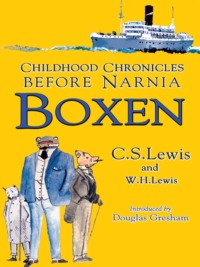
Полная версия
Boxen: Childhood Chronicles Before Narnia

Peter next went to Pip Castle for some clients were generly waiting for him. On his way home Sir Peter saw a large mouse with out a tail!! Peter did not go back to his house but followed the stranger for some distance, and then measured his foot-mark and made a picture of it.
Next night Sir Peter put a dummy of wood in his bed and he him-self sat up all night and watched from the garret window. Before doing so he set a ‘non-killing’ mouse-trap, it was like a small man-trap.
After watching for some time he saw a mouse coming twards the house. As soon as Mr No-Tail came near he got caught in the trap. ‘Come and help me!’ cried No-Tail as soon as he saw Peter at the window. Peter Mouse came out and let him go, then he asked No-Tail to stay the night with him. He took No-Tail in and gave him some beer then Peter led him up-stairs and gave him a bed, and as he slept went down to the polease office. Then he got No-Tail ‘run in’.

THE RELIEF OF MURRY
We had been listening to Peter all the afternoon, but now we went out to enjoy the cool summer air. ‘Peter’ was the famous and illoustrius knighte Sir Peter Mouse and ‘We’ myself and some friends. Peter had been telling us a goode olde taile about a knight and his ladye. She was called Maude.
But we had got tired of the legande, the good knighte was telling, and perchance it was an easy one to get tired of. So we did come into the grounds of Pip Castle to enjoy ye fine summer winds.
Now quoth I to Sir Peter, ‘Wilt go a-hawking on the banks of the Jemima my lord?’
‘Sooth a goodly speech,’ quoth Dorimie.
But Sir Peter said, ‘Nay nay sirs more serios work is there than that. Hast not heard the news from Murry?’
‘Nay tell it me good sir,’ quoth I.
And Sir Peter said, ‘The cats have beseiged Murry and it is like to fall into there hands if we do not send them help very soon.’
‘Well gossip that is surely bad news,’ said Dorimie, ‘and if thy worship will consent we shall send help in the morning.’
‘I my self will head the expedition. Huray!!’
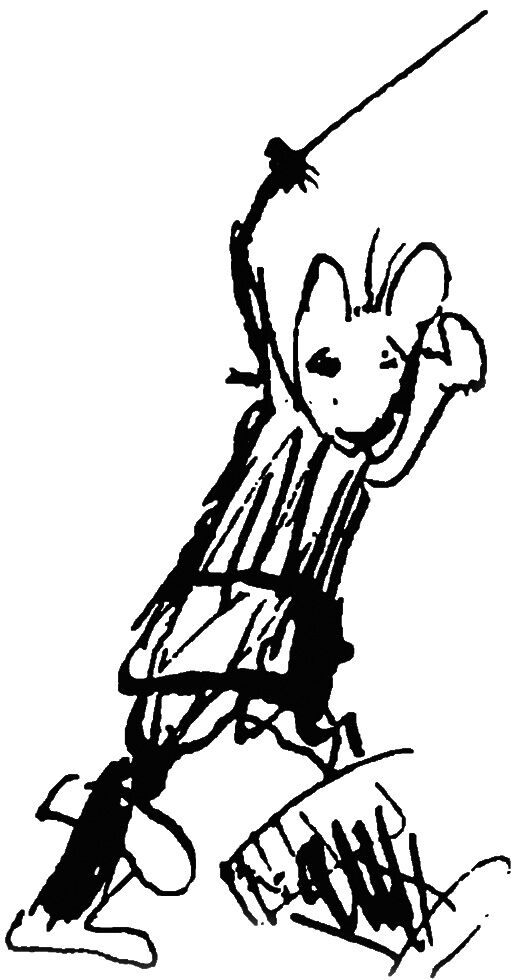

Next morning after an early breakfast we started in the direction of Murry which we sighted in the late evening. It was surrounded completly by the enemyes tents. I realy felt quite thin as we skurried about among these rows of guns and armed men (cats I mean). Once we were chalanged but we pretended to be a cat picket, then we camped in the shadow of a friendly forest.
In the early morning we covered our shining armour with dark cloaks and crept up behind the cat-sentrys back each and killed him. Then we rushed in and set fire to the hostile tents. The confusion was dreadfull. Everywhere the boom and sullen thunder of guns, the groans of the wounded the crackle of the fires and the wild shouts of ‘Sir Peter for ever’ then on ‘In the name of the king!’ When all of a suden the long fierce strain was over. The cats had fled. There camp was smoking ruins. Murry gates were open. The seige was raised!
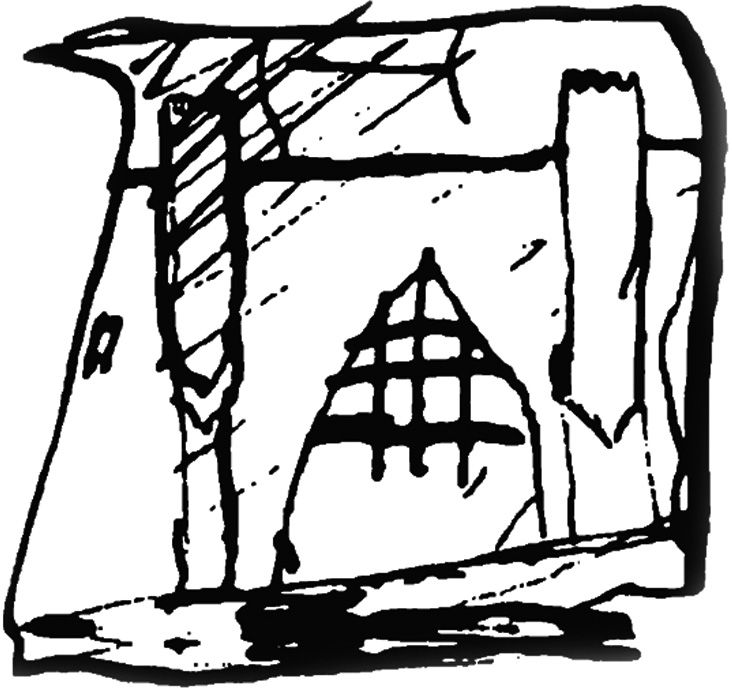
HISTORY OF MOUSE-LAND
FROM STONE-AGE TO
BUBLISH I (OLD HISTORY)
(55 B.C.) Perhaps no greater country ever was seen in life than Mouse-land and yet one might have thought it might be ignorant oweing to its long ‘stone-age’ which lasted from B.C. 55 to – 1307!! How ever this was not the case. Mouse-land we find is the leading country of the globe!!
(51 B.C.) At first the Mouse-landers were divided into small tribes under chiefs, and continuly fighting with each other.
(49 B.C.) Hacom, chief of the Blue-Bottle tribe marched to Dorimie Castle and murdered the owner, namely Damus, for the sake of the castle and domain. (47 B.C.) He then took the castle, after which it was known as Hacom’s Palace.
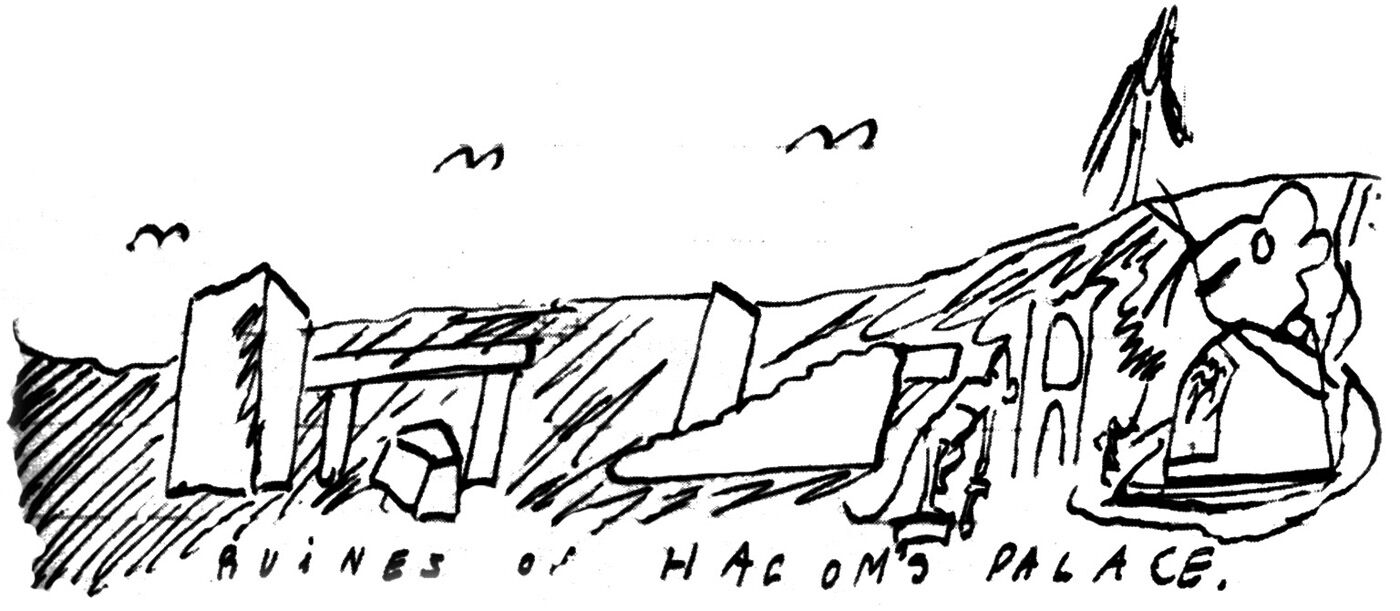
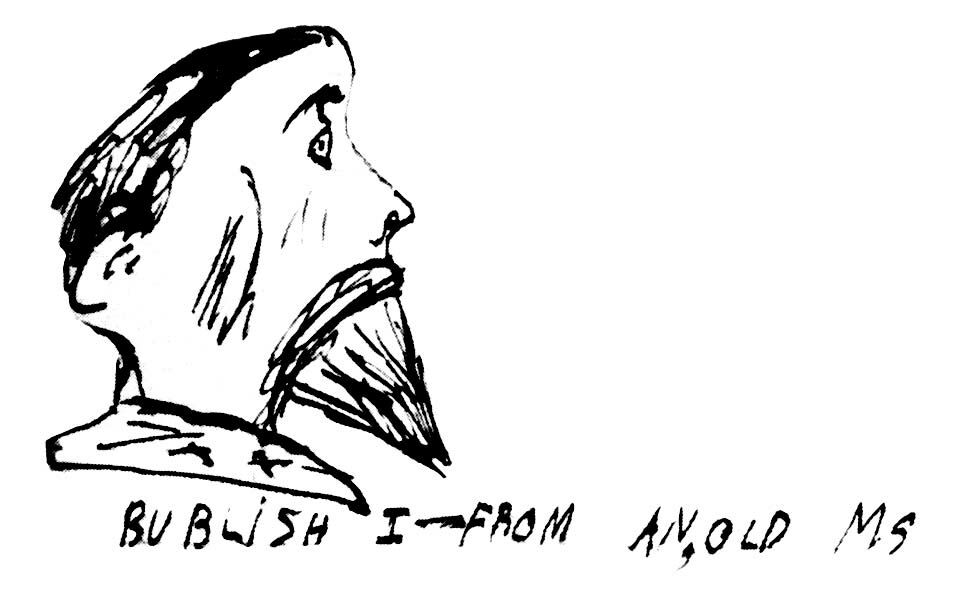
Damus in his life had been cheif of the Cosy Tribe, and his death did not disperse his tribe. When they heard of the murder they were very angry and determined to revenge thear king!! So they rose against Hacom and met at Hacom’s Place in 43 B.C. where the castle was laid in ruins and Hacom slain. After which the Cosy became the most powerful tribe in the land.
In those days Mouse-land was called ‘Bublish’ and the mice called Bubills.
Shortly after the ‘Melee of Hacom’s Palace’ (for so it shall be called) some inhabitints of Bombay came over to buy nuts. They taught the mice many things. The most important of which was: the use of money. Before that the Mice (or Bubils as they were called) exchanged things in markets. The Indians landed in 1216.
The Indians as it has been told gave knowledge to the Bublis. But the Bublies asked for some of it. The Bublis asked the Indians how they got on without fighting each others men. The asked ones told the Bublis that they choose a man to rule them all and called him Rajah or king.
The Bubils followed that plan. But no!! ‘Out of the frying-pan into the fire.’ Poor miss led creatures. Now they fought all the more!! Why? Because each mouse wished to be king. One had as much right to the throne as an other. So every place was fighting.
The new chief of the Cosy tribe was named after his country: ‘Bublish’. He being the most powerful man1 in the land raised an armie and marched to Dorimie Castle (the old one had been rebilt). When he got there he found that they had chosen another Mouse to be king named Poplar. Bublish pretendit to be quite loyal to him but made him promise that after his death Bublish schould rule.
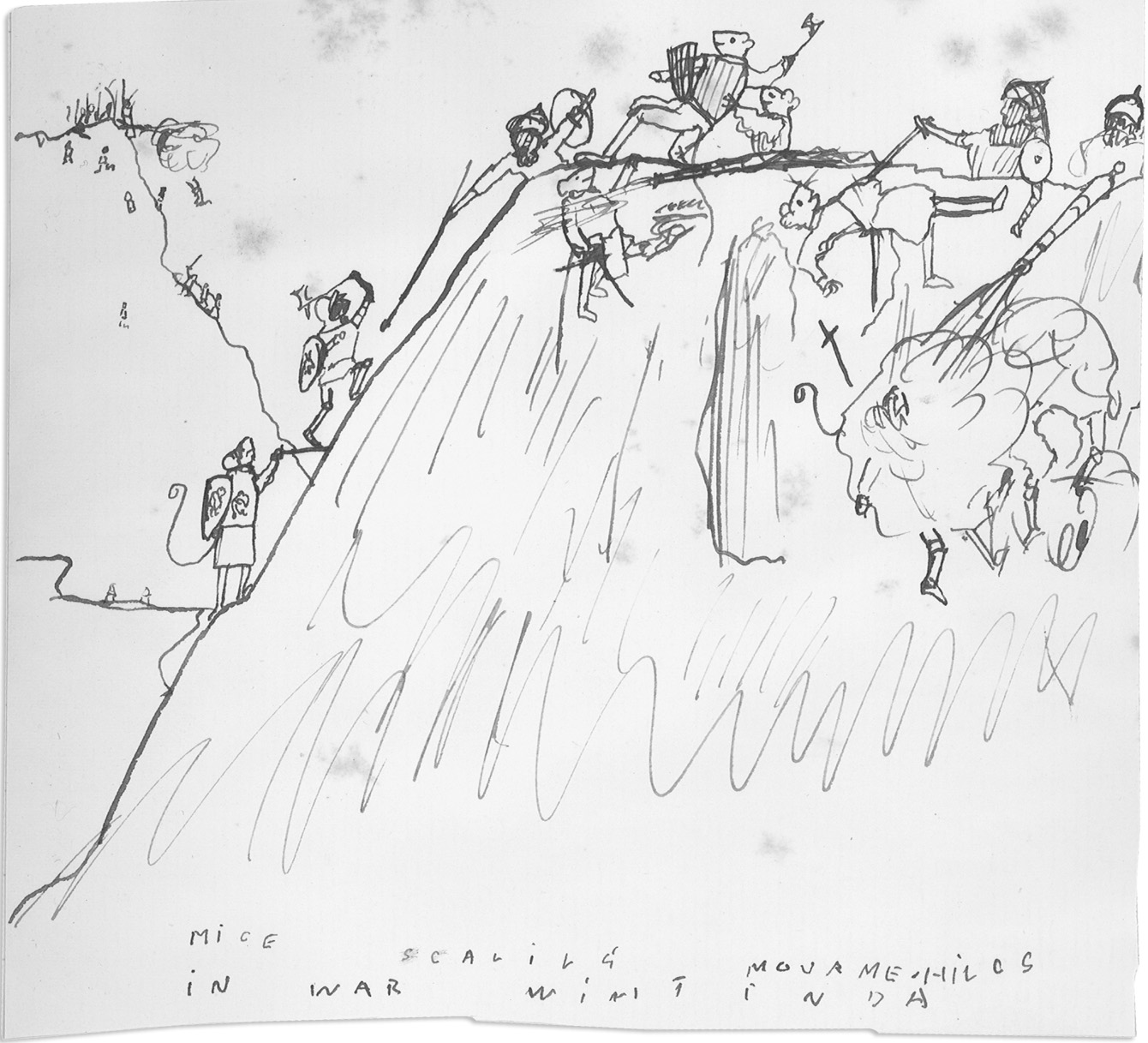
A BATTLE BETWEEN MICE AND INDIANS
HISTORY OF ANIMAL-LAND
(NEW HISTORY)
BOOK I
It is not my aim in writing this book to compile a full manual of Animal History but merely to set forth in consecutive order some more important facts.
Chapter I
INDIAN SETTLEMENT

The earliest written records of Animal-Land come from the Pongeeins. That nation, under its leader Chin conquered Animal-land when still a land of barbaric tribes. These records, however useful, are often impossible and many of them must be legends. Pongee seems to have held Animal-land until its downfall, when like all empires Pongee subsided. As soon as the Pongeein soldiers were withdrawn from Animal-land the numerous & bloody tribal struggles recomenced. The chief tribes were the Cosois, Draimes, Mansquoos & some others. The first notable event was the landing of some Indian settlers in the North of Animal-land. They landed near the Jemima River, in what was after-wards Mouse-Land. The Cosois, a tribe of Mice, whose chief was Hacom, received them well. The Indians stayed, intermarried with the mice, & helped against their hostile tribes.
About 100 yrs later the Indians advocated peace. The tribes agreed, & Hacom, grandson of the former Hacom, who had Indian ancestors on his mother’s side, was elected King. He was the first proper King of ‘Calico’ as the northern part of Animal-land was then called. Long afterwards the southern states remained uncivilized. After this all the Indians returned to their own country.
Hacom used his power well. He called counsel of chiefs corresponding to our modern parliament. Without its consent nobody could be punished, or rewarded, nor could any new law be enacted. This assembled once a year.
Shortly after his 3rd Counsel Hacom crossed the borders of Calico with the idea of conquering Pig-Land. The pigs under their various chiefs (who had now united against Hacom, as a common enemy) advanced to meet him. The 2 armies met at a place called Kuckton (near where Marston now stands). Hacom fought well, and would have won had he not been outwitted by a clever feint on the part of the pigs. The Calician force was beaten, but still, much had been done towards the subjection of the pigs. Hacom was severly wounded by a stray arrow, but might have recovered, had he not been obliged to spend the night in the fields. It was winter, and the wound froze causing instant death. He had been an excellent king.
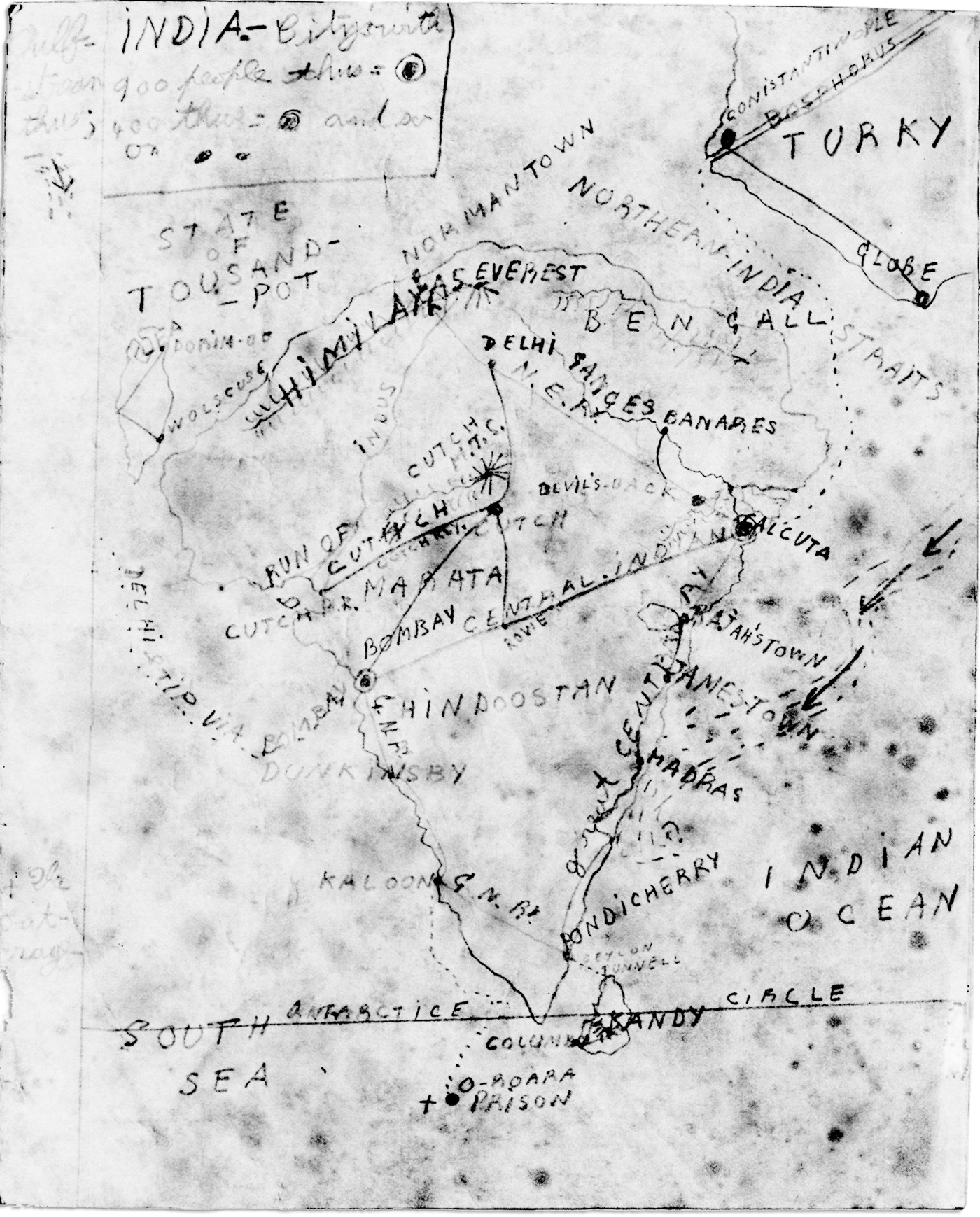
Chapter II
KING BUBLISH I

The people now chose Bublish, Hacom’s 2nd cousin, to be their king. There was another heir nearer (Hacom’s brother Johannus). But Bublish was very rich & powerful, and had many ‘todies’ and managed to get himself crowned instead. He christened the country ‘Bublish’ after himself, which was meant to be witty, but really only showed his conceit. He took it into his head that the soldiers (quartered in Pip-Castle) and their families were too friendly to Prince Johannus, and he was afraid lest they should rebell in his favour. So he held a fearful massacre of all inhabitants of Pip-Castle, men, women, and children. One person alone did he spare – Dormee, the governer of the Castle because he was sure of a good ransom for him. All through that year such brutal barbarities went on, so that it is often called ‘Misery Year’. He refused to call the ‘Damerfesk’ as the counsel of Hacom was called; he set King Hacom’s good laws (which he had sworn to keep & enforce) at defiance. However he carried his game too far even for himself. He had fancied his power shaken by the adherence of the Pip-Castle people to Johannus, but in reality it had been far more shaken by his own cruel massacre of them. His cruelty and deceitfulness roused all (except some of his own mercenaries) to revolt. And in the next year, a great rebellion headed by Johannus arose. The rebels broke their way into Murry Castle (partly owing to the treachery of Bublish’s own mercenaries) and Johannus himself killed Bublish.
Chapter III
KING BENJAMIN

Johannus expected to be made king on the death of Bublish. But the counsel which he called pointed out in as complimentary a way as it could, that, though an excellent general, Johannus was quite unfit for the kingly office. Wisely he did not insist, and most generously giving way, allowed Benjamin (surnamed ‘The Bunny’) Duke of Rabbit-Land, to be peacably crowned in his stead. The new king begged Johannus not to retire into private life, and made him a ‘Marshell’, an entirely new title which was given to the chief General of the king’s forces. Johannus complyed with the king’s wish, and remained an important person in the state. Benjamin was the grandson of Hacom, and therefore popular.
Johannus had not long been at his new post, as head of the Calician Army, before he had work to do; war broke out with Ojimywania, or Clarendon as it is now called. The cause of the war was this: in Bublish a certain Lord Giles, from Boot-Town (in the uncivilised south of Animal-land) emigrated to Ojimywania and became one of its great noblemen. He told Dracho, King of Ojimywania, many tales of Animal-Land and the Ojimywanians took advantage of the uncivilised condition of the southern states of Animal-Land to, in a kind of way, to appropriate them. At first they merely came and settled. Presently they took Boot-Town by storm, captured it, and drove out the inhabitants (who were mainly rats, and beetles). Johannus was busy putting down the cats, who had risen in rebellion, and did not hear of it. The first to notice the alarming power of the Ojimywanians in the south of Animal-land, was a young Gollywog with a very loyal heart, who made his way, with other Animal-landers from his home near Maine-Hoching, to Murry. On his way he encountered a band of 16 Ojimywanians, whom he put to flight. On his reaching Murry, he was made a Knight, and given a pension of 12 bresents1 per year for life.
Benjamin now decided that the only thing to be done was to send Johannus and the army south. He did so and he himself went with the army. As soon as the Ojimywanians found out that the Calicians had heard of their inroads on the southern states, they made the most of their time, and seized as many towns and fortresses as they could. They even ventured as far north as Horse-Land, which was part of Calico. By the time Johannus and the king reached Horse-Land, they found that the enemies had gained possession of Maine-Hoching, the capital of that state. The inhabitants of the city met the Calician Army with tales of the injustice & cruelty they had suffered from the Ojimywanians, who, according to their custom, had driven out the citizens as soon as they gained the towns. So there were now no people in Maine-Hoching, but Ojimywanians. Johannus and the King laid seige to Maine-Hoching. For almost a year it bravely held out, but it was at length obliged to surrender. What remained of the garrison were treated with leniancy, but most of them had been killed during the seige, and many weaker ones had starved.
The army advanced, then, out of Calico farther south. Under the able leadership of Johannus and the King, nearly the whole of the south was cleared of Ojimywanians. Not content with this, the King organized a naval expedition to Ojimywania. He himself was to head it, & Johannus was to stay behind. Just before he went, the southern states begged that they might be united to Calico and all Animal-Land be one Kingdom. This was just what the Calicians wanted, and the union was effected.
Benjamin then sailed for Ojimywania leaving Lord Mearns, Mayor of Murry, as regent. The King and his division of the army gained no success in the expedition. After some fighting Benjamin was taken prisoner and would have been executed, had not Sir Jasper and his 2 sons bravely rescued him. Of the Jaspers we will hear more. Peace was made. As soon as the King was safely home, he made reforms in the ‘Damerfesk’. In the days of Hacom it had been an assembly of Chiefs, so, later on it included the great nobles alone. So the common people had no say at all. King Benjamin with the help of his Chancellor Lord Big (a frog) passed many reforms giving 2 untitled commoners the right to come to the Damerfesk from each state.
Just now Johannus died of a fever. He was a great loss to the state, and his death was universally, and deservedly lamented.
About this time a mouse named Jas. Hit stole the Crown Jewels and escaping from prison, fled to Ojimywania. This effects Animal-Landish history because so many degenerate Animal-Landers fled to Ojimywania, and the ill-feeling between that country & Animal-Land increased until it seemed as if a second war was likely. Just at that point, the old King died. He was known as ‘Benjamin the great’.
Chapter IV
THE ACCESSION OF KING MOUSE THE GOOD
AND THE FELINE REVOLT

He [Sir Peter Mouse] probably meant to go on to Englington, and, taking with him the soldiers quartered there, march to Cat-land and reduce the natives to submission. However, while his soldiers were encamped for the night, the Cats stole up with an enormous army-posted themselves on a hill, high above the mice; threw up a rampart of earth, placing there infantry (mostly bowmen) behind it, and their cavalry in front of it, ready to charge down the slope of the hill onto the mice (see map). While Sir Peter’s army was still asleep, the cavalry charged down upon the camp, and did untold damage; then, before the mice could recover from their surprise or properlly arm themselves, the cavalry cleared away, and the bowmen shot their arrows into the camp. Then the whole Cat force swept down and the Mice were utterly routed. Sir Peter Mouse was slain and very few mice escaped. The Cats hotly pursued the few fugitives to Murry, and then beseiged the capital itself! The Cats sent home for more soldiers and more supplys. After almost a year and a ½, (during which time the citizens suffered terrible privations), the seige was raised by 2 mice who had risen from the ranks; one of them was Thomas Jasper (son of Sir Jasper, who had rescued King Benjamin), and the other his friend Robert. How they did it is not certain, because so many stories about them are fables: but it is likely they did it by cunning: after this the Cats retired to their own state.
As soon as a good army had been collected Thomas and Robert went to Cat-Land. After a sharp short struggle, (the mice often fighting against tremendous odds), Cat-Land was conquered, and forced to unite with the rest of Animal-Land. The Cats attempt to conquer Mouse-Land did themselves a lot of harm: because, for many many years they were regarded with suspicion and hatred, and were not allowed to enjoy equal privilages with the other states of Animal-land.
All through this reign the crown had been very weak. So had the ‘Damerfesk’: in fact it had only been called twice in the whole reign! The great nobles, when not engaged in fighting the Cats, were usually carrying on private wars with their retainers. While the Southern States had become as uncivilised as they had been before the union. So, though in a Romantic sense, Thomas and Robert had made it glorious, it was a bad reign, specially for the poor. Soon after the conquest of Cat-Land, the old king died, worn out by anxiety.
The end of the first Book
BOOK II
Chapter I

After the death of King Mouse the ‘Damerfesk’ was hastily called, to hold a consultation concerning who should next reign. The obvious hier to the throne was young Bublish: but the memory of his father’s bad reign made him so unpopular, that he was exempted by a special act, and compeled to retire into private life. It was then decided that Animal-Land should be a Commonwealth or Republic. Lord Big (son of Sir Big, who had been executed by Sir Peter Mouse), tried to become 1st president (or ‘governor’, as he was then called) of the Commonwealth: but the nobles had had so much power in the last reign, and had so oppressed the poor, that the commons all over the country (under Balkyns, a Murry citizen,) revolted. Many nobles were murdered, and many castles destroyed. Balkyns approved of a Commonwealth, and made himself governer. The emancipation of the Commons would have been a good thing had they used their power, thus gained, well. But unhappily they used it exceedingly badly: they had no sympathy with persons who were not in the same rank of life, or did not fall in with their ideas.
Balkyns had an executioner called ‘Thurlow’. This man was a marvelously good speaker. Now he used to be payed, not a fixed salary, but per execution: so whenever a person was being tried for his life, he (Thurlow), would come into the court and speak forcibly against the prisoner. By this, and other foul means, many perfectly innocent, honest people were put to death. It was nicknamed ‘2nd Misery Year’, which recalled the brutal times of King Bublish. Just when things seemed likely to come to a crisis Balkyns died.
Sir Peter Mouse, son of Sir Peter of the last reign, marched down from Pip-Castle to Murry with a very large force. As all except a few of Balkyns’ friends were heartily tired of his rule, Sir Peter Mouse met with little or no opposition; he called the ‘Damerfesk’. Every-one agreed to continue the commonwealth, but to restore the power to the middle-classes. A Murry citizen named Perren, forcibly advocated a union between the parliaments of Animal-land and India. Through some extrodinary misunderstanding, this was regarded as treason. And Sir Peter and his friends, sentenced the good-hearted, but foolish Perren to be burnt. By the advice of Lord Twinklebury of Squirrel-Land, and some others, Sir Peter Mouse offered the governmentship of the commonwealth to Albert Leppi, a student of Eglington university. Leppi accepted it gladly, and was soon proclaimed governer.
Chapter II
GOVERNOR LEPPI I

The new governor proved to be the greatest scholar the Animal-Landers had ever seen, – but that was all. His talent for learning seems to have been more madness than anything else. He was cruel, foolish, stubborn, and weak. He first lent his confidence to Archbishop Quicksteppe who was well meaning, but narrow minded.
The most notable event which happened during the Quicksteppian Ministry was the rise of the Chessaries. For a long time Chessmen had been hated and oppressed. They were scattered here & there, unhoused, hated, hunted & penniless. The first to try and improve their condition was a chess-king called Flaxman. He tried to build the first chessary near Boot-Town, in the reign of King Mouse I. He was mistrusted and misunderstood! So he emigrated to Tararo where the Chessmen prospered among the amiable but primitive natives. During the Quicksteppian Ministry, he and his followers returned to Animal-Land, and this time gained more success. Two large Chessaries were founded, one at Boot-Town and the other at Murry; and also a smaller one at Peaktown. As the Chessaries were seats of learning (like universities): and as they lodged the poor at very low costs, they soon became popular with the peaple. Quicksteppe saw this and tried Flaxman for ‘treason’. That noble Chessman was convicted and burned.
Sir Peter Mouse, then openly expressed his approval of the Chess movement: and in the next meeting of the ‘Damerfesk’ he attacked Quicksteppe, and was banished. Leppi, and his favourite had done a foolish thing for Sir Peter was popular. The Archbishop was murdered.
Конец ознакомительного фрагмента.
Текст предоставлен ООО «ЛитРес».
Прочитайте эту книгу целиком, купив полную легальную версию на ЛитРес.
Безопасно оплатить книгу можно банковской картой Visa, MasterCard, Maestro, со счета мобильного телефона, с платежного терминала, в салоне МТС или Связной, через PayPal, WebMoney, Яндекс.Деньги, QIWI Кошелек, бонусными картами или другим удобным Вам способом.



